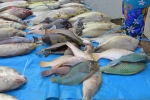Herbivorous fishes are important members of the ichthyofaunal community on coral reefs. They fulfil important roles in sustaining the productivity and health of the coral reef benthos, for example in contributing to the maintenance of stony coral dominance, and at the same time are important fishery targets in many parts of the world. A number of broad functional categories of herbivory – such as grazing, browsing and scraping – are traditionally recognized, and redundancy of species within these broad categories is assumed to contribute to ecological resilience of the ecological functions herbivores fulfil. In recent years, this broad view is increasingly challenged, as information on finer niche separation, differences in the trophic plasticity of various species, and the role of environmental factors in controlling the realized trophic niches of herbivorous species emerges. Furthermore, observations of herbivorous functions in species for which these were previously unknown – so-called sleeping functional groups – underline the scarcity of ecological knowledge on coral reefs and their high heterogeneity in space and time. This presentation reviews the ecological functions of herbivorous fishes on coral reefs and recent developments in their study in order to critically reflect upon the idea of functional redundancy.
Functional redundancy in fish herbivory on coral reefs – a tenable concept?
Speakers
Dr. Sebastian Ferse (ZMT)
Institute
Leibniz Centre for Tropical Marine Research (ZMT)
City, Country
Bremen, Germany

Event
Wednesday Lunch Seminar
Date from
- 20/12/2017
Time from
12:00
Time to
13:00
Location
ZMT, seminar room Fahrenheitstraße 6
Host
Prof. Dr. Martin Zimmer




